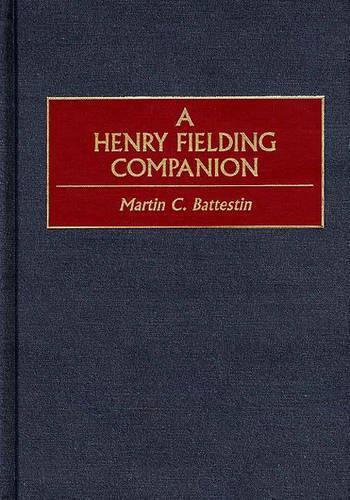
A Henry Fielding Companion
(Hardback)
Publishing Details
A Henry Fielding Companion
By (Author) Martin C. Battestin
Bloomsbury Publishing PLC
Greenwood Press
30th June 2000
United States
Classifications
Tertiary Education
Non Fiction
Literary studies: fiction, novelists and prose writers
Biography: general
823.5
Physical Properties
Hardback
360
Width 156mm, Height 235mm
680g
Description
Best remembered as the author of Joseph Andrews (1742), Tom Jones (1749) and Amelia (1751), Henry Fielding was one of the most important pioneering English novelists of the eighteenth century, and his works continue to occupy a central place in the literary canon. During the 1730s he was the most dominant playwright in London since John Dryden; and in his official capacity as a magistrate, he addressed serious social problems and invented the modern metropolitan police. This reference book makes essential information available to readers interested in Fielding, his life, and his works. The volume is organized in sections devoted to such topics as Fielding's residences; his family members and household; historical persons, including authors who influenced him; his works; themes and topics important to his writings; and characters in his plays and prose fiction. Each section contains numerous entries on particular items, and many entries provide brief bibliographical information. While the sectional organization of the volume invites the reader to explore broad areas of interest, a thorough index provides convenient alphabetical access to the entries. A brief introductory essay and chronology begin the volume, and the book concludes with an extensive bibliography.
Reviews
"The work Professor Battestin has produced, A Henry Fielding Companion, is a remarkable achievement. It is full of accurate information and important insights presented in a very clear and attractive style. A Henry Fielding Companion will be of great benefit to both the eighteenth-century specialist and the general reader."-Frederick G. Ribble Author of Fieldings Library: An Annotated Catalogue
"Fielding studies have flourished in the past forty years in large part because its examplars, Messrs. Battestin and Paulson, have set a high standard for work that articulates relationships: sermons and satire, social history and literary tradition, life and works....[o]ffers copious biographical and textual information; its two pages (219-220) on Fielding's "manuscripts" are remarkable for the generosity with which they condense a lifetime's pursuit of these documents. But the Companion also includes entries on Dryden, Rochester, Pope, Swift, and the Scriblerus Club that reveal Mr.Battestin's mastery of the great theme of Mr.Paulson's early career, the relationship between "satire and the novel.""-The Scriblerian
Battestin has prepared a delightful vade mecum for academic readers, undergraduates through faculty, who are studying Fielding and his world....Highly recommended.-Choice
Fielding studies have flourished in the past forty years in large part because its examplars, Messrs. Battestin and Paulson, have set a high standard for work that articulates relationships: sermons and satire, social history and literary tradition, life and works....[o]ffers copious biographical and textual information; its two pages (219-220) on Fielding's "manuscripts" are remarkable for the generosity with which they condense a lifetime's pursuit of these documents. But the Companion also includes entries on Dryden, Rochester, Pope, Swift, and the Scriblerus Club that reveal Mr.Battestin's mastery of the great theme of Mr.Paulson's early career, the relationship between "satire and the novel."-The Scriblerian
The ease of reference from this list--names cited under their works--allows a user efficiently to group ideas and character traits better to understand the pattern in the carpet of Fielding's works....The light that Professor Battestin casts shows fully the plenitude, variety, and organicism in Fielding's life and literature. Rich in local detail, A Fielding Companion makes us naturalized citizens of Fielding's world and time. Opening that work to cultivate our sympathetic understanding, Martin Battestin performs the ultimate act of liberal learning through significant scholarship.-The East-Central Intelligencer
The organizations, frequent cross-referencing, table of contents, and index provide easy access to a complete range of the life and works of Henry Fielding.-ARBA
"Battestin has prepared a delightful vade mecum for academic readers, undergraduates through faculty, who are studying Fielding and his world....Highly recommended."-Choice
"The ease of reference from this list--names cited under their works--allows a user efficiently to group ideas and character traits better to understand the pattern in the carpet of Fielding's works....The light that Professor Battestin casts shows fully the plenitude, variety, and organicism in Fielding's life and literature. Rich in local detail, A Fielding Companion makes us naturalized citizens of Fielding's world and time. Opening that work to cultivate our sympathetic understanding, Martin Battestin performs the ultimate act of liberal learning through significant scholarship."-The East-Central Intelligencer
"The organizations, frequent cross-referencing, table of contents, and index provide easy access to a complete range of the life and works of Henry Fielding."-ARBA
Author Bio
MARTIN C. BATTESTIN is William R. Kenan, Jr., Professor Emeritus of English at the University of Virginia. He is coeditor of the Wesleyan Edition of the Works of Henry Fielding and the author of several books on eighteenth-century literature. His numerous articles have appeared in such journals as Eighteenth-Century Fiction, Studies in Bibliography, Studies in Philology, Eighteenth-Century Studies, ELH, PMLA, and Philological Quarterly.
